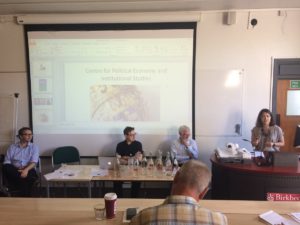Birkbeck Criminology Seminar Series: From Corporate Killing to Social Murder
18:00-19:30, Thursday 1 March 2018
Speaker: Professor Steve Tombs (Department of Social Policy & Criminology, Open University)

Corporations kill in a variety of ways across diverse sites and spheres of activity. Such killing is ubiquitous, routine and widespread – notwithstanding formal attempts by states to prevent and respond to such deaths. Focusing on a sub-set of such deaths in the UK, and state attempts to regulate these, this paper argues that these should be understood as state-corporate violence, best captured by the term ‘social murder’.
Grenfell Tower has come to represent many things to many people since the tragic fire on 14th June. Prior to that date, the Tower was a home to hundreds of residents – if not, according to some of them, a particularly pleasant one. The aim of this presentation is two-fold: first, to understand the reach of states and corporations into what is often represented as a private sphere, namely the home; and, second, to better understand the mass killing at Grenfell Tower, and the ripples of harms subsequently engendered, as phenomena produced by state-corporate policy and practices.
To register for this event, please see here.
About the Criminology Seminar Series
In line with the School of Law, Birkbeck’s research and teaching ethos, the Criminology Seminar Series aims to provide a platform for critical and interdisciplinary research, showcasing prominent and path-breaking research on crime, criminal justice and related themes by scholars from within and beyond Birkbeck. The series is convened by Dr Sappho Xenakis, School of Law, Birkbeck.
Picture credit: Image is by Fernando Botero: Abu Ghraib #67 (2005). University of California, Berkeley Art Museum and Pacific Film Archive Gift of the Artist, 2009.12.42 Photographed for the UC Berkeley Art Museum by Benjamin Blackwell.

 The School of Law, Birkbeck are pleased to hold a workshop to exchange perspectives on the interaction of critical legal theory and political economy in relation to international economic law.
The School of Law, Birkbeck are pleased to hold a workshop to exchange perspectives on the interaction of critical legal theory and political economy in relation to international economic law.

